|
|
|
Sort Order |
|
|
|
Items / Page
|
|
|
|
|
|
|
| Srl | Item |
| 1 |
ID:
182618
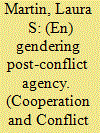

|
|
|
|
|
| Summary/Abstract |
This article explores how female agency and experience manifest in a local Sierra Leonean peacebuilding program known as Fambul Tok. While post-conflict literature, namely transitional justice and peacebuilding, has become more critical in recent years, there is still a tendency to generalize both the ‘local’ and ‘women’. There is, however, much greater scope to delineate how local programs shape and are shaped by women in these settings. While Fambul Tok was, at least theoretically, meant to better align with the needs and priorities of Sierra Leoneans, including women, the empirics suggest that female engagement ultimately results in a wide range of outcomes, which are not necessarily more ‘empowering’, ‘transformative’ or ‘good’ than international programs. Drawing on original empirical data from Fambul Tok, this article highlights the complexity of gendered power relations within these programs and how individual women have multiple, diverse and contested forms of agency and experiences within local settings.
|
|
|
|
|
|
|
|
|
|
|
|
|
|
|
|
| 2 |
ID:
107221
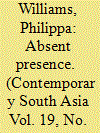

|
|
|
|
|
| Publication |
2011.
|
| Summary/Abstract |
This paper examines the everyday experiences and perspectives of Muslim Ansa-ris (weavers) in urban north India with respect to the 'welfare state'. The case of a recent health insurance scheme, initiated by the Indian government, constitutes the paper's focus. Narratives around the scheme expressed by residents in a majority Muslim mohalla- (neighbourhood) in Varanasi illustrate the ways in which the state's presence was more often experienced through its perceived absence and inaccessibility. But even whilst such experiences represented broader patterns of neglect, locally interpreted as the upshot of being India's largest religious minority, this community was not stricken by a sense of absolute alienation and nor did individual or collective actions exhibit outright disaffection towards the state. More appropriately, 'defensive agencies' informed by degrees of pragmatism, acceptance and resilience, were articulated in an effort to protect, as well as improve the future capacities and ambitions of the neighbourhood residents where the state had seemingly failed. The paper concludes however with a word of caution about celebrating such agency, and reflects on the potential for transformative politics by Muslims in urban India.
|
|
|
|
|
|
|
|
|
|
|
|
|
|
|
|
| 3 |
ID:
174930
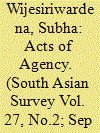

|
|
|
|
|
| Summary/Abstract |
In Sri Lanka, abortion continues to be a criminal offence under the Penal Code of 1883. Several attempts have been made to challenge the colonial-era law since the 1990s with no success thus far. This study documents and centres the knowledge of women and transpersons in accessing abortion and sexual health and reproductive health services in Sri Lanka in order to contribute to the conversation on abortion law reform as well as research and advocacy. Our data suggest that the existing legal reforms proposed to the abortion law would be unresponsive to the needs of women and transpersons in Sri Lanka, and that in additional to legal changes, we would need significant social and cultural changes. This study uses feminist research methodologies, building towards a feminist ethics in abortion research.
|
|
|
|
|
|
|
|
|
|
|
|
|
|
|
|
| 4 |
ID:
171330
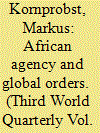

|
|
|
|
|
| Summary/Abstract |
How much agency do African states have to shape global orders? This study puts the global nuclear order under scrutiny to answer this question. It amounts to a demanding case. Arms control is something that global great powers take very seriously, and there is no weapons category that they take more seriously than nuclear weapons. My findings provide a nuanced picture. Although often outflanked and frustrated by nuclear weapon states, the nuclear order would look different without African actors exerting their agency. They successfully shaped background and foreground institutions constituting the global nuclear order by building advocacies for new institutions upon already existing ones, reaching out to state and non-state actors outside of Africa, and channelling communication through African states with authority in global fora. This study makes three contributions: First, it underlines the key finding of recent literature on African agency that African actors are more to be reckoned with than often assumed. Second, it provides novel evidence about the diplomatic mechanisms through which they come to make a difference. Third, it adds to our grasp of the constitution of global orders as well as the processes through which they come to be made, re-made and unmade more generally.
|
|
|
|
|
|
|
|
|
|
|
|
|
|
|
|
| 5 |
ID:
159973
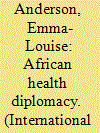

|
|
|
|
|
| Summary/Abstract |
Health crises pose fundamental challenges to international relations and have been a major focal point of contests for global influence, particularly in the global South, where such crises are most acute. This necessitates a focus on the arenas of global health diplomacy and the power struggles that emanate from them, including the often-overlooked agency of African actors within these arenas. Drawing upon a total of 3 months of fieldwork in 2007 and 2014 that included 68 key-informant interviews, participant observations, and informal discussions, this article interrogates the mechanics of multi-stakeholder health diplomacy in Malawi, where a near-permanent state of health crisis and underdevelopment has generated extreme dependency on external health assistance. This article conceptualises shadow diplomacy as the informal networks and channels of influence that run parallel to, but are not recognised as part of, formal diplomacy. This concept reveals how health is key to struggles for leverage by both international and local actors, giving rise to informal and subversive manifestations of diplomacy in the ‘shadows’. It enables us to understand not only how Western powers consolidate and obscure their enduring power but also how the ‘shadows’ benefit African political elites as they leverage their dependency to subvert global power structures for their own ends. It disrupts the external/internal binary of international donors/African states and reveals that these are not monolithic actors but instead comprising complex individuals with multi-faceted motivations and divided loyalties.
|
|
|
|
|
|
|
|
|
|
|
|
|
|
|
|
| 6 |
ID:
185091
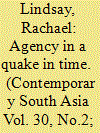

|
|
|
|
|
| Summary/Abstract |
This article explores agency through humour and time amongst a group of Pakistani young men who reside, or recently resided, in a refugee shelter for unaccompanied minors in Athens, Greece. It asks how their jokes about alternate futures might challenge the slow, structural violence which places these young men on the margins of society in terms of work, space, and temporality. Despite a lack of anthropological work on humour, particularly amongst migrant communities, this article takes up humour as an analytical tool due to its pervasive presence in the shelter and its challenge to the discourse of victimhood of migrant children. I ultimately argue that conventional theories about the role of humour fail to fully account for the temporalities that these jokes around futurity evoke. This article also sheds light on the various constructs of time at play within the lives of these young men and how these are disrupted in the moment of the joke. It asks what modalities of agency emerge during these jokes when we employ Deleuze’s non-linear syntheses of time and seeks, ultimately, to look beyond conventional assumptions of youth agency and structural inequality, and to question the premises upon which such conventions are built.
|
|
|
|
|
|
|
|
|
|
|
|
|
|
|
|
| 7 |
ID:
194337


|
|
|
|
|
| Summary/Abstract |
The liberal international order (LIO) is now in a complex crisis. Its legitimacy and sustainability are put to the test with the growth of deglobalization forces, the rise of emerging powers dissatisfied with the LIO designed by the US, and climate change and the global pandemic. The crisis of the LIO is particularly salient in the Indo-Pacific, the epicenter of the US-China strategic competition, and secondary states in this region are increasingly concerned about its geopolitical consequences. However, I argue that secondary states often treated as the pawns of great powers can turn this circumstance to their advantage by adopting various strategies that maximize their leverage. We should take seriously the possibility that secondary states, by which I denote all states that are weaker or smaller than the hegemonic state and the rising power, can shape the contours of the US-China strategic competition and the newly emerging international order in the Indo-Pacific region. Preoccupied with great power politics, the existing literature on order transition has neglected the fact that secondary states can develop and exercise their own agency. Moreover, it remains vague what agency means in IR and how secondary states enact it. Against this backdrop, I propose an analytical framework that unpacks various types of agency along three dimensions—the motivation of agency, the type of mobilized resources, and the availability of partners. It will help us explain how weaker and smaller states participate and make their voice in reshaping international order in the Indo-Pacific.
|
|
|
|
|
|
|
|
|
|
|
|
|
|
|
|
| 8 |
ID:
194339


|
|
|
|
|
| Summary/Abstract |
The structural dynamics of the Korean conflict has evolved not only with the inter-Korean rivalry, but also the geopolitics of great power rivalries. The conflict structure was reinforced going through the Korean War and the Cold War. There have been several South Korean initiatives to build peace with North Korea in the post-Cold War era, however the peace process fluctuated due to the escalation of the US-North Korean conflict over the nuclear and missile development of North Korea, and the dispute over North Korea policy in the South Korean society. Building on the sociological understanding of ‘duality of structure’ and the biological insight of ‘niche construction’, this article demonstrates the South Korean potential, as a democratic state, to construct a niche space for its citizens’ peacebuilding with North Korea under the ongoing Korean conflict structure, as well as its limitations in protecting the space before scaling out the disruption of the conflict structure, when governments do not have a clear sense of agency about their policy due to the lack of consensus among its citizens.
|
|
|
|
|
|
|
|
|
|
|
|
|
|
|
|
| 9 |
ID:
123582
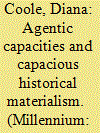

|
|
|
|
|
| Publication |
2013.
|
| Summary/Abstract |
In this article, I note that the idea of a new materialist turn has recently been gathering steam. The first part considers some of the signature elements of the new materialisms. The most distinctive aspect identified here is the invocation of a generative or vital ontology of immanence. Following discussion of some of its principal claims, the article draws out its implications for reconceptualising agency, in particular regarding the way agentic capacities are recognised to be distributed across animate, and perhaps also inanimate, entities. The significance of this development for the political sciences is then explored. In a second part, I suggest that the new materialism entails a normative project. Here, ethical overtures towards a new sensitivity predicated on vital materialist insights are contrasted with a renewed critical theory. The latter is commended as a material reckoning of the 21st century: a project provisionally labelled a capacious historical materialism.
|
|
|
|
|
|
|
|
|
|
|
|
|
|
|
|
| 10 |
ID:
166148
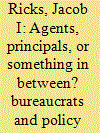

|
|
|
|
|
| Summary/Abstract |
In the aftermath of the 2006 and 2014 Thai coups, observers declared the resurrection of the bureaucratic polity. Bureaucrats, though, remained influential even during the period of 1992–2006, when elected politicians were thought to command the Thai state. Bureaucratic involvement in politics poses a challenge for dominant political science theories of politician–bureaucrat relationships, which draw heavily from principal–agent frameworks. I apply agency theory to Thailand, testing three different hypotheses derived from the theory. Examining legislative productivity and control over bureaucratic career trajectories, I find that elected politicians increasingly acted as principals of the Thai state from 1992 through 2006, and to a lesser degree from 2008 to 2013. Thai bureaucrats, though, have frequently engaged in the political sphere, blunting political oversight and expanding their independence vis-à-vis politicians. This suggests that the principal–agent model overlooks the range of resources that bureaucracies can bring to bear in developing countries, granting them greater autonomy than anticipated. As such, theories of the politician–bureaucrat relationship in developing states need to better account for the mechanisms through which bureaucrats exercise policy discretion and political influence.
|
|
|
|
|
|
|
|
|
|
|
|
|
|
|
|
| 11 |
ID:
195400


|
|
|
|
|
| Summary/Abstract |
Intelligent machines – from automated robots to algorithmic systems – can create images and poetry, steer our preferences, aid decision making, and kill. Our perception of their capacities, relative autonomy, and moral status will profoundly affect not only how we interpret and address practical problems in world politics over the next 50 years but also how we prescribe and evaluate individual and state responses. In this article, I argue that we must analyse this emerging synthetic agency in order to effectively navigate – and theorise – the future of world politics. I begin by outlining the ways that agency has been under-theorised within the discipline of International Relations (IR) and suggest that artificial intelligence (AI) disrupts prevailing conceptions. I then examine how individual human beings and formal organisations – purposive actors with which IR is already familiar – qualify as moral agents, or bearers of duties, and explore what criteria intelligent machines would need to meet to also qualify. After demonstrating that synthetic agents currently lack the ‘reflexive autonomy’ required for moral agency, I turn to the context of war to illustrate how insights drawn from this comparative analysis counter our tendency to elide different manifestations of moral agency in ways that erode crucial notions of responsibility in world politics.
|
|
|
|
|
|
|
|
|
|
|
|
|
|
|
|
| 12 |
ID:
138260
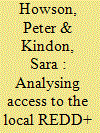

|
|
|
|
|
| Summary/Abstract |
The Reducing Emissions from Deforestation and Forest Degradation (REDD+) project in Sungai Lamandau was Indonesia's first forest carbon finance initiative officially proposed by a community group upon land they intended to control autonomously. However, the flagging carbon market and government licensing obstructions stalled progress towards possible monetary gains. With a focus on the agency of local farmers, we explore the ‘bundles of powers’ that they mobilised to access the other diverse and, at times, elusive set of benefits within the REDD+ project. In the absence of a formal tenure and ‘carbon rights’ regime, local actors' ability to benefit from the project was dependent on social relationships, REDD+ knowledge and access to local markets and capital. The result was a benefit-sharing framework of uneven distribution.
|
|
|
|
|
|
|
|
|
|
|
|
|
|
|
|
| 13 |
ID:
188818
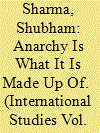

|
|
|
|
|
| Summary/Abstract |
In this article, I attempt to critically assess Kenneth Waltz’s deployment of the idea of anarchy to erect a ‘scientific theory of international politics’. First, I argue that the formation of a concept requires comprehension of the object from the standpoint of historical development, not a narrow reading of it. Second, I subject the thinner abstractions of self-help, balance of power and bandwagoning to the test of history. Third, I argue about mainstream international relations’ disdain for revolutions. I would posit that revolutions are fine templates which store rich agential history of structural transformation, a theme subject to much chagrin by realists of all hues, particularly neorealists. In doing so, I take the Bolshevik Revolution of 1917 as my benchmark. I elucidate that through the occlusion of first and second images, man and state, in the favour of third image, that is, structural anarchy, Waltz tends to ignore the role of agency as a conscious collective which could be best captured by the Bolshevik Revolution. In doing so, I rely on Perry Anderson’s three modes of agency in history. As a corrective to Waltz’s theorization, I make a strong case for class transcending both man and state as an organic category with immense potential of becoming a level of analysis which both acts upon the structure and refracts through it. I finally conclude by saying that anarchy was a condition and not a ‘social relation’ of any sort which could claim to constitute the ‘international’.
|
|
|
|
|
|
|
|
|
|
|
|
|
|
|
|
| 14 |
ID:
195078


|
|
|
|
|
| Summary/Abstract |
This article explores what it means to ‘animalise’ International Relations (IR). The posthuman move in the social sciences has involved the process of de-centring the human, replacing an anthropocentric focus with a view of the human as embedded within a complex network of inter-species relations. In a previous work we drew attention to the lack of analysis within International Relations of the key role played by more-than human animals in situations of conflict. The current COVID-19 pandemic again indicates that an analysis of international relations that does not have at its core an understanding of a more than human world is always going to be an incomplete account. The paper argues for the animalising of International Relations in order to enhance inclusivity, and suggests five ways in which this might be approached. As it becomes increasingly clear that a climate-related collapse is imminent, we argue for a transformative approach to the discipline, stressing interlinked networks and a shared vulnerability as a political project which challenges capitalism (advanced/late/carboniferous/genocidal) and the failure of states to address the concatenation of crises that life on the planet confronts.
|
|
|
|
|
|
|
|
|
|
|
|
|
|
|
|
| 15 |
ID:
196612


|
|
|
|
|
| Summary/Abstract |
Women who are currently serving in a variety of combat roles and combat support positions in many state militaries around the globe have had to struggle for their positions by proving their abilities, and such struggles are still ongoing. Based on interview materials with veterans, this article examines the ways in which the veterans interpret their roles as women in combat positions and how they understand agency. The article further traces how their presence in war could alter the gendered meaning of protection. While the military is a key institution of overt gendered power in the state, women combatants’ voices can create a crack in the masculine dominance that is taken for granted in state narratives; they can also create a wedge that allows in a reconsideration of gendered roles and power relations in the context of militaries, thereby offering more nuanced interpretations of protection and agency.
|
|
|
|
|
|
|
|
|
|
|
|
|
|
|
|
| 16 |
ID:
197731


|
|
|
|
|
| Summary/Abstract |
China's party diplomacy—the Communist Party of China's own international outreach—has become an important component of China's foreign relations. Given Southeast Asia's strategic importance, the Communist Party of China (CPC) has been proactively engaging political elites in the region. What are the immediate changes party diplomacy brings about for Southeast Asian actors, and how do they translate into long-term consequences? I propose a three-pronged framework to explore the local effects of China's party diplomacy, respectively, concerning exposure to ideas, the pursuit of interests, and the emergence of controversies. Drawing on a novel dataset and using illustrative cases of Vietnam, Singapore, Myanmar, and Malaysia, I show how the effects are contingent on the agency of Southeast Asian actors and domestic dynamics in each country. From the standpoint of Southeast Asian elites, engagement with the CPC could bring about ideational and material benefits, while domestic pushback, if any, is easy to deflect and tends to fade away over time. China's party diplomacy is best described as a moderate status quo multiplier that leads to noticeable changes without triggering structural shifts.
|
|
|
|
|
|
|
|
|
|
|
|
|
|
|
|
| 17 |
ID:
195428


|
|
|
|
|
| Summary/Abstract |
Securitization theory posits that security threats are socially constructed. Yet, how audiences influence the failure and success of securitization attempts is still not well understood. In this article, I argue that audiences bring their normative perspectives to bear upon the interpretation of securitization attempts. This theoretical addendum, I hold, permits a fuller appreciation of how audiences express their agency when receiving securitization attempts. I examine the Singaporean context, where the discursive backdrop favours the construction of security threats. While the Singaporean government has successfully securitized many issues, Lee Kuan Yew’s attempt to securitize the country’s declining birth rates failed dramatically. This occurred, I contend, as the Singaporean public was deeply offended by the normative premises of Lee’s eugenicist argument, thus refusing to engage with the issue on the government’s terms. These objections were only fuelled by the eugenics programme the government later introduced, ultimately causing the government to discontinue its pronatalist policies and significantly revise its rhetoric. This article develops the understanding of how securitization unfolds by expanding on the conceptualization of audience behaviour. By examining Singapore, which has failed to inspire many analyses of securitization, it also diversifies securitization theory’s empirical reach, highlighting its intelligibility within non-democratic contexts.
|
|
|
|
|
|
|
|
|
|
|
|
|
|
|
|
| 18 |
ID:
124052
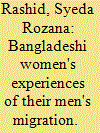

|
|
|
|
|
| Publication |
2013.
|
| Summary/Abstract |
This article examines Bangladeshi women's experiences of their men's migration. It focuses on the lifestyles, household responsibilities, and levels of compliance with or defiance against dominant gender ideologies concerning the everyday lives of left-behind women in two migration-intensive villages in Bangladesh. By locating the meanings and substance of women's power and agency in the context of their living arrangement in nuclear, joint, and natal families, I argue that the choices and priorities of these women be interpreted beyond liberal feminist models of "empowerment" and "emancipation."
|
|
|
|
|
|
|
|
|
|
|
|
|
|
|
|
| 19 |
ID:
183177
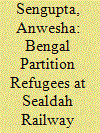

|
|
|
|
|
| Summary/Abstract |
This article focuses on the Sealdah railway station in Calcutta, West Bengal, as a site of refugee ‘settlement’ in the aftermath of British India’s partition. From 1946 to the late 1960s, the platforms of Sealdah remained crowded with Bengali Hindu refugees from East Pakistan. Some refugees stayed a few days, but many stayed for months, even years. Relying on newspaper reports, autobiographical accounts and official archives, this article elaborates how a busy railway station uniquely shaped the experiences of partition refugees. Despite severe infrastructural limitations, the railway platforms of Sealdah provided these refugee residents with certain opportunities. Many preferred to stay at Sealdah instead of moving to any government facility. However, even for the most long-term residents of Sealdah, it remained a temporary home, from where they were either shifted to government camps or themselves found accommodation in and around Calcutta. The article argues that by allowing the refugees to squat on a busy railway platform for months and years, the state recognised a unique right of these refugees, their right to wait, involving at least some agency in the process of resettling.
|
|
|
|
|
|
|
|
|
|
|
|
|
|
|
|
| 20 |
ID:
105921
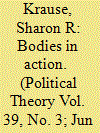

|
|
|
|
|
| Publication |
2011.
|
| Summary/Abstract |
A better appreciation of the material, distributed quality of human agency can illuminate subtle dynamics of domination and oppression and reveal resources for potentially liberatory political action. Materialist accounts of agency nevertheless pose challenges to the notion of personal responsibility that is so crucial to political obligation and democratic citizenship. To guard against this danger, we need to sustain the close connection between agency and a sense of selfhood that is individuated, reflexive, and responsive to norms. Yet we should acknowledge that reflexive selfhood is not the whole of individual agency for the sources of agency extend beyond the individual herself. We also need to recognize the ways that both reflexivity and norm-responsiveness are themselves embodied capacities. When properly conceived, a materialist view of agency can increase awareness of our often-unwitting contributions to systematic inequalities of power and extend our political responsibilities in emancipatory directions, thus holding great promise for democratic
|
|
|
|
|
|
|
|
|
|
|
|
|
|
|
|
|
|
|
|
|